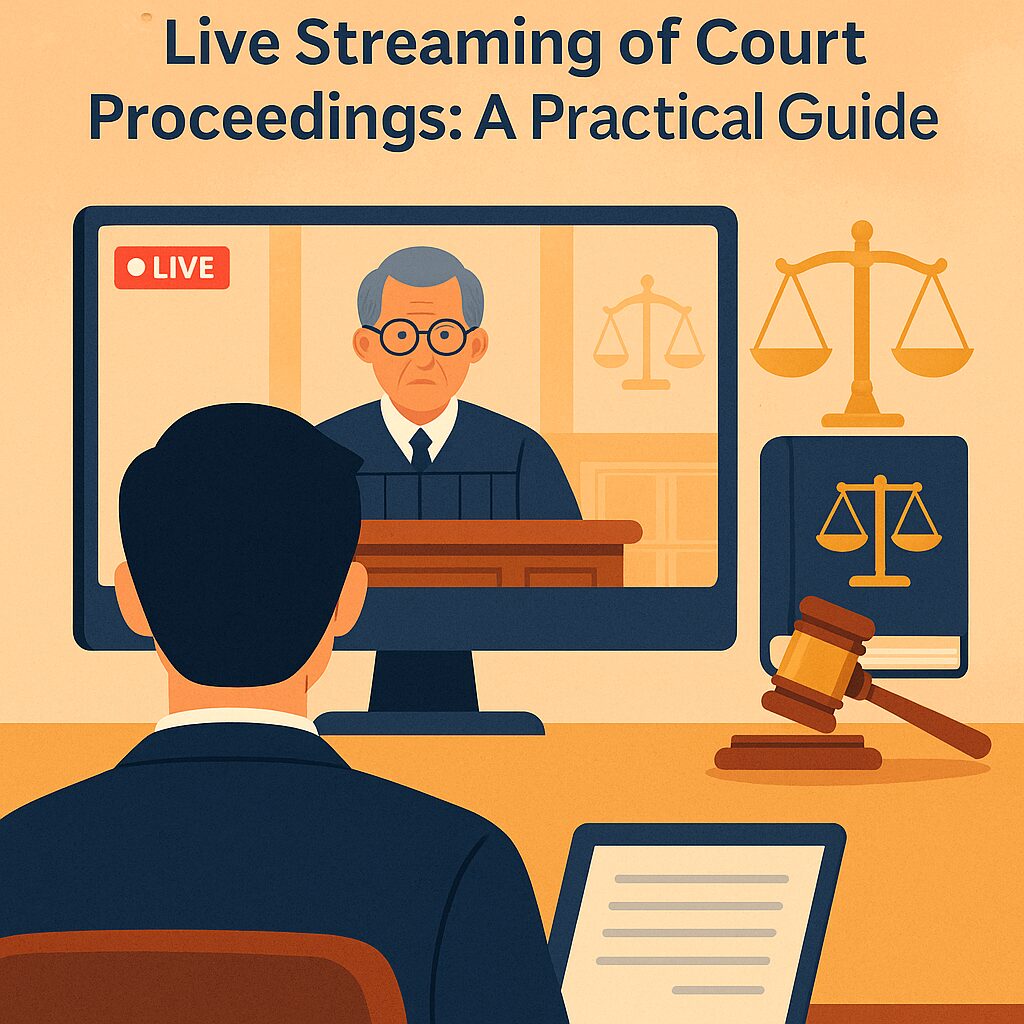
Table of Contents
Introduction
The live streaming of court proceedings by the Supreme Court of India as well as by various High Courts including the High Courts of Madhya Pradesh, Gujarat, Patna, Calcutta, etc. have not just ensured transparency in the court proceedings by making the parties aware of the day to day proceedings in their matters. The live streaming has also opened new avenues for law students and young lawyers to learn the practical application of the law.
By virtue of live streaming a student sitting in any part of the world can observe matters involving constitutional law, public matters, commercial disputes amongst others. However, passive watching of case proceedings might not be of much help unless there are active takeaways by the law students and younger members of the bar.
In this article, we will discuss the ways to observe court proceedings with purpose, how to observe the strategy in a case, etc.
How to Watch with Purpose?
A lot of people just hit the live button without even knowing the type of case which is being dealt by the court. One might not be able to understand the matter easily in such circumstance. Thus, while observing the case proceedings, one should inculcate the habit of asking questions and know about the type of case being argued and at what stage the case is.
Asking questions like – Is it a bail matter? A constitutional issue? or a tax appeal might benefit you in understanding the subject matter being dealt by the court and if it interests you. Further, one must know if the case is listed for admission, or for some interim relief or whether the final arguments are going on.
Pro tip: Keep a litigation journal. Title the entry with the case name, court, and matter type. This alone will separate you from passive viewers.
Learn the Courtcraft
Once you are logged into a live case proceeding, focus on the courtcraft. You can observe the structure of arguments of various counsels.
- How does the lawyer open his/her arguments? Do they start with the facts or law? Do they use particular phrases before beginning their arguments, etc.
- What is the tone of their arguments? Calm, assertive, deferential?
- How to respond to the queries put forth by the bench?
- How are the precedents being used to bolster the arguments?
You might like the way a particular senior advocate argues. However, you must go one step further by trying to understand the reason behind a particular acts or styles of advocacy being presented based on the circumstance of each and every case. This way you can build your own advocacy style by learning from multiple seniors.
Focus on one subject matter a day
Focusing on a particular type of matter on a given day can help you streamline and understand a particular branch of law in a better way. Like some days could be reserved for observing bail matters and NI Act matters might be taken on some other day.
When you focus on a particular category of cases, you begin to see the patterns. For example in bail matters, you might observe some of the generally asked queries from the bench, like:
- What is the urgency?
- What is the stage of trial going on?
- How much custody has the accused or convict undergone?
- What is the age of the accused/ convict?
Use the Lawyer’s lens
If you want to be a litigator, watch proceedings like a junior advocate in chambers:
- Prepare a short note on the case as if you were assisting.
- Note the things you didn’t understand and research it later.
- Try to find precedents that support your case.
Over time, this habit trains your brain to analyze and not just admire.
Observe and learn the soft skills
Along with learning the law, learning the soft skills are also crucial to become a complete lawyer. It is important that lawyers do not bluff or seek adjournments without any reason. Some of the soft skills to be learnt include:
- How lawyers dress and carry themselves
- How they handle hostility from the bench
- How they apologize, clarify, or pivot under pressure
Senior Advocate Shree Rajshekhar Govilkar in an interview with Legally Flawless emphasized courtroom readiness: being loud and clear, well-groomed, and expressive enough to hold the court’s attention. These small things are never taught, but they matter deeply.
Discuss
After watching the court proceedings, discuss with a peer or mentor:
- What worked in the argument?
- What flopped?
- How would you have argued it?
Discussing the court proceedings turns passive watching into active learning.
Every live streamed court proceeding has a takeaway that can be put to use—in moot courts, internships, or in your next case.
Conclusion
The Courtroom is now your classroom. Live-streamed court proceedings are a game-changer. But they only work if you do. So the next time you tune into the Supreme Court or a High Court livestream, don’t do it just to tick a box. Do it with intention, curiosity, and discipline.
You’ll be surprised at how much your advocacy improves. Because the secret isn’t in watching. It’s in how you watch.
All efforts are made to ensure the accuracy and correctness of the information published at Legally Flawless. However, Legally Flawless shall not be responsible for any errors caused due to oversight or otherwise. The users are advised to check the information themselves.


